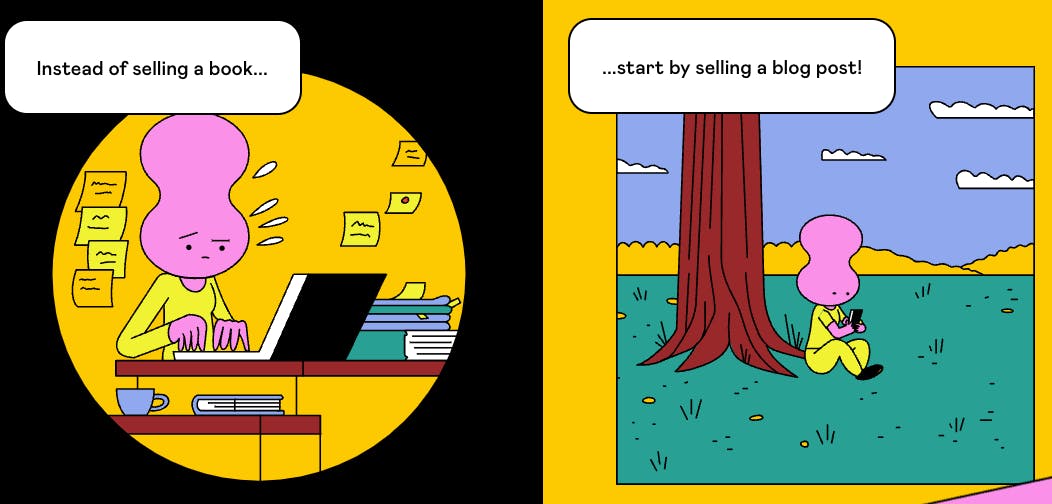If it's true that you learn something new every day, today might be the day you learn about the fishbowl method.
Stooa is a fishbowl tool that facilitates orderly, free-flowing, and participatory discussion. Makers Fran Lopez and Annachiara Sechi explained the concept to inquiring commenters. Four to six chairs form a circle, i.e. the fishbowl, while the rest of the group listens. The fishbowl has only two requirements: There must always be a free chair (remaining chairs are filled by the organizers/facilitators) and the conversation can only take place inside the fishbowl.
“The free chair can be taken by anyone in the audience who has something to input into the discussion: questions, insights, data, etc. When this happens, someone from the circle has to leave the fishbowl so that there is always a free chair. This gives everyone a chance to take part and enriches the conversation with relevant content.”
At only a glance, Stooa may look like any other meeting tool, but its automatic facilitation of the fishbowl method makes it unique from the Zooms of the world and many audio rooms, too. Unlike Twitter Spaces or Clubhouse, there’s no hand-raising or requests to join the stage. It’s easy to see how an open seat could enable communities, academic circles, and teams to welcome more inclusive and productive conversations.
We’ve seen other startups work to tackle inclusivity in meetings. Macro, which was acquired by mmhmm earlier this month, used an airtime map to visualize speaking time, adjusting the video size across contributing participants in the hopes of nudging participants to speak up or vice versa. Macro was sunsetted, but all of its makers have joined the mmmhmm team to continue building products to make meetings “more human.”
In today’s launch, the makers of Stooa also mention they follow an agile work methodology and implement a Kaizen culture: a philosophy where employees are actively engaged in suggesting and implementing improvements to the company. It’s worth noting here that Stooa is an open-source project with a public roadmap — that fits the bill, too.
We’re really intrigued by the idea of using the fishbowl methodology to support more inclusive discussion, especially among a growing workforce of remote and dispersed teams.
Would you try hosting your next discussion as a fishbowl?
- Developers loved the launch of Formspree over the weekend. Makers simply submit front end code to the Formspree API to generate a form.
- Tired of repetitive TED talks? TED SMRZR lets you compare similar TED talks by reading their summaries — in 73+ languages.
- If you’re a maker that’s found most e-mail countdowns look like 💩,, you might like this alternative email timer that other makers created for you to use for free.
- Gameon Active is like Airbnb but for helping schools, leisure centers, community halls, etc. book their facilities.
- Feeling frisky? Crack up at these NSFW logos or these NSFW NFTs (hint: 🍆) which also support a great cause.

Your team is wasting days or even weeks trying to onboard customer data, which is typically unstructured and filled with validation errors. The result? A poor customer onboarding experience, and countless hours of data wrangling.
Enter Flatfile.
Onboard customers faster, decrease time-to-value and slash churn with Flatfile Embeds, a 1-click data onboarding experience with HIPAA, GDPR, SOC 2 Type 1 compliance out the box.
- Import customer data in as little as 60 seconds.
- Free your team from cleaning spreadsheets for hours.
- Provide a world-class data onboarding experience.

Gumroad has unveiled a new brand, with founder Sahil Lavingia noting on the company’s blog: “We’ve revisited every decision we’ve ever made about our unique business strategy to center the things that make us unique... We’re not just a tech platform, we’re promoting a lifestyle.”
The rebranding sits within a new chapter for Lavingia and Gumroad. The founder has written openly about the startup’s struggles after it had exhausted its funding and his own feelings of failure. Gumroad has now slimmed down and reprioritized, which has translated into things like dissolving work hours, sharing financials, and pursuing crowdfunding instead of venture capital.
In step with these changes, Lavignia’s launched his book, “The Minimalist Entrepreneur,” last month, too. You can check that out along with…
